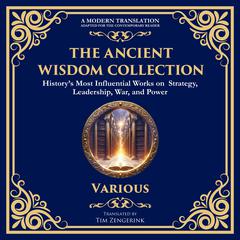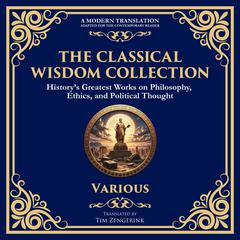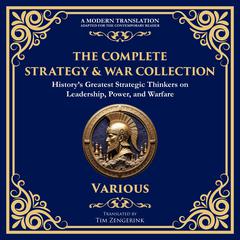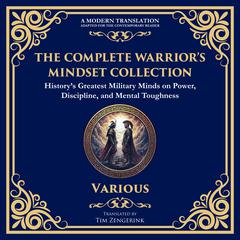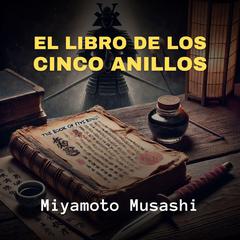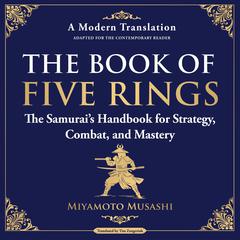 Play Audiobook Sample
Play Audiobook Sample
The Book of Five Rings Audiobook
 Play Audiobook Sample
Play Audiobook Sample
Quick Stats About this Audiobook
Total Audiobook Chapters:
Longest Chapter Length:
Shortest Chapter Length:
Average Chapter Length:
Audiobooks by this Author:
Publisher Description
Setting down his thoughts on swordplay, on winning, and on spirituality, legendary swordsman Miyamoto Musashi intended this modest work as a guide for his immediate disciples and future generations of samurai. He had little idea he was penning a masterpiece that would be eagerly devoured by people in all walks of life centuries after his death.
Along with The Art of War by Sun Tzu, The Book of Five Rings has long been regarded as an invaluable treatise on the strategy of winning. Musashi's timeless advice on defeating an adversary, throwing an opponent off-guard, creating confusion, and other techniques for overpowering an assailant was addressed to the readers of earlier times on the battlefield and now serves the modern reader in the battle of life.
In this new rendering by the translator of Hagakure and The Unfettered Mind, William Scott Wilson adheres rigorously to the seventeenth-century Japanese text and clarifies points of ambiguity in earlier translations. In addition, he offers an extensive introduction and a translation of Musashi's rarely published The Way of Walking Alone.
Download and start listening now!
"This book has nothing to do with the Olympic movement. In fact it is so far removed from the spirit of DeCoubertin that the title becomes ironic. It is a book about killing people in the shortest posible time, in the most effective way without exposing oneself to too much risk of injury. It is the statement of a personal philosphy of warfare both on a personal level and in warfare. There is a Platonic element in which general theory is derived from a particular situation. It is not long but is hard hitting and almost brutal. It also is endowed with the spirit of Bushido that made the Samurai what they were."
— Huw (5 out of 5 stars)
Quotes
-
On Wall Street, when Musashi talks, people listen.
— Time
The Book of Five Rings Listener Reviews
-
" Considered the classic treatise on samurai swordsmanship, this book does offer one a glimpse at the philosophy behind the use of the katana, which is rare, but it sadly lacks a manner by which to fully understand and visualize what Musashi is trying to explain to the reader. Certain words of wisdom can be easily understood, and applied to the modern battlefield and life in general, but much of what he says is too abstract to truly grasp in terms of application. "
— Glen, 2/19/2014 -
" Practial guide to doing things properly. "
— Ant, 2/11/2014 -
" I should try to reread it I guess, I just don't get it "
— Rodrigo, 1/21/2014 -
" Treat the sword language as a metaphor for debate, and this thing reveals a whole new dimension to the reader. "
— Erik, 1/17/2014 -
" Best book ever! My martial arts teacher recommended this to me because it not only teaches young samurai how to efficiently defeat an opponent; and gives important life skills for how to be successful in life. "
— Tyler, 1/8/2014 -
" A good book for strategy, but the principles can be applied in other areas besides warfare. Take some time and read this one, it can teach you some good lessons. "
— Neil, 1/4/2014 -
" Miyamoto Musashi is amazing. Ultimate Samurai, Insightful Writer, Amazing Artist. A True Japanese Renaissance Man. "
— Stephen, 12/21/2013 -
" This is a book written by an accomplished samurai duelist. While it seems to be touted as a life philosophy book, I found it to be more of a fighting manual than anything else. There is no doubt that Miyamoto Musashi was a great warrior, but he's a second rate philosopher at best. "
— Rembo666, 11/23/2013 -
" If you like The Art of War, you will love this book. "
— Eddie, 10/29/2013 -
" One of my favorites, bad ass, he was. "
— Dean, 10/10/2013 -
" Interesting, slightly confusing. Lots of "you have to study this well", does feel like there's more to discover. I heard people praising it over The Art of War, probably that one had a better editor, while I haven't made up my mind either way. "
— Gergely, 12/12/2012
About Miyamoto Musashi
Miyamoto Musashi (1584–1645), famed swordsman, was born Shinmen Takezo in Harima Province and may have fought at Sekigahara under the Ukita as a common soldier. He claimed to have defeated his first opponent (a certain Arima Kihei) at the age of thirteen. He wrote that he engaged in sixty duels without suffering defeat once, and he was noted in this regard for his skill at handling two swords at once. Much of Musashi’s life between 1600 and 1640 is the stuff of legend, and some have postulated that he served at Osaka Castle on the defending side, taking quite a few heads in the process. In 1640 Musashi accepted service with the Hosokawa clan and three years later, in Higo Province, began work on his great book The Book of Five Rings. He finished this influential work on swordsmanship in May 1645—the same year he died.
About Scott Brick
Scott Brick, an acclaimed voice artist, screenwriter, and actor, has performed on film, television, and radio. He attended UCLA and spent ten years in a traveling Shakespeare company. Passionate about the spoken word, he has narrated a wide variety of audiobooks. winning won more than fifty AudioFile Earphones Awards and several of the prestigious Audie Awards. He was named a Golden Voice by AudioFile magazine and the Voice of Choice for 2016 by Booklist magazine.



